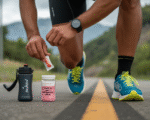“`html
The Nitrate-Endurance Connection Explained
For endurance athletes, optimizing oxygen delivery and utilization is paramount. This is where dietary nitrates have emerged as a significant player. But how exactly does a compound found in everyday vegetables translate into improved performance on the track or trail? It all starts with a fascinating biological conversion process.
When you consume foods rich in nitrates, such as leafy greens or beetroot, these inorganic compounds are relatively inert initially. However, beneficial bacteria residing in your mouth begin the transformation. They convert the dietary nitrates into nitrites. Swallowing the nitrite-rich saliva then allows these compounds to enter your bloodstream. In conditions of low oxygen, which often occur in working muscles during intense exercise, the body can efficiently convert these nitrites into nitric oxide (NO).
Nitric oxide is a potent signaling molecule with a crucial role in the cardiovascular system. One of its primary functions is promoting vasodilation—the widening of blood vessels. By relaxing the smooth muscle walls of arteries and arterioles, nitric oxide increases blood flow throughout the body, critically enhancing the delivery of oxygen and nutrients to the muscles working hardest. This improved circulation means your muscles receive oxygen more readily and efficiently, potentially delaying the onset of fatigue.
Beyond simply boosting oxygen supply, nitric oxide also impacts the muscles’ internal machinery. Research suggests that NO can reduce the oxygen cost of producing ATP (adenosine triphosphate), the body’s energy currency, within muscle cells. This means your muscles require less oxygen to perform the same amount of work, effectively improving their energy efficiency, particularly during prolonged, submaximal exercise. This physiological shift allows athletes to maintain a higher intensity for longer periods before reaching exhaustion, providing a distinct ergogenic advantage.
This intricate pathway—from dietary nitrate, through bacterial conversion to nitrite, and finally to the production of performance-enhancing nitric oxide and subsequent vasodilation and improved muscular efficiency—forms the scientific basis for nitrate’s growing popularity among endurance athletes. Understanding this connection is key to appreciating the potential benefits of incorporating nitrates into your training diet.
Beetroot Juice: Nature’s Nitrate Powerhouse
Beetroot juice has firmly established itself in the world of endurance sports, lauded as a natural and potent source of dietary nitrates. Athletes are drawn to this vibrant crimson drink not just for its unique taste, but primarily for its potential to enhance performance by boosting the body’s nitrate levels through the pathway explained previously. This section delves into why beetroot juice is considered a powerhouse and how athletes typically incorporate it into their regimen.
At the core of beetroot juice’s ergogenic properties is its remarkably high natural nitrate concentration. While the exact amount can vary based on factors like soil conditions, climate, and specific beetroot varieties, it consistently provides a significant dose of these beneficial compounds. This natural variability is a characteristic differentiating it from standardized supplements, but it also means the nitrates are consumed within a complex natural matrix.
Beyond nitrates, beetroot juice is packed with other valuable nutrients, including the distinctive betalains that give it its deep red-purple hue, and a range of other phytonutrients. These additional compounds are thought to possess antioxidant and anti-inflammatory properties. The concept of synergy is important here; some research suggests that the combination of nitrates with these other naturally occurring plant compounds may offer benefits that extend beyond those provided by nitrates alone, potentially enhancing absorption or overall physiological impact.
For endurance athletes looking to harness these benefits, strategically consuming beetroot juice is key. Typical dosing strategies often involve concentrated shots or larger volumes of standard juice, timed around training and competition. Common approaches, often based on sports nutrition research, include:
- Consuming a dose providing approximately 400-500mg of nitrate, typically found in a concentrated shot or about 500ml of standard juice, 2 to 3 hours before exercise.
- Employing a “loading” phase by consuming a similar dose daily for 3 to 7 days leading up to a major endurance event to ensure elevated nitrate levels.
Adopting such structured approaches, which can be explored further through studies on platforms like PubMed, allows athletes to maximize the potential physiological benefits of beetroot juice for improved oxygen utilization and performance during prolonged activity.
Nitrate Supplements: Concentrated Boost or Shortcut?
Moving beyond nature’s package, many athletes turn to nitrate supplements. These typically come in various forms, most commonly pills or concentrated powders, offering a standardized dose of nitrates. Unlike beetroot juice, which has natural variability in nitrate content depending on factors like soil, growing conditions, and processing, supplements aim for consistency. This means you know precisely how many milligrams of nitrates you are consuming with each serving, which can be appealing for those seeking very controlled dosing protocols.
However, this standardization often comes with a trade-off. While delivering concentrated nitrates, these supplements usually lack the array of other beneficial plant compounds found naturally in beetroot. Beetroot contains betalains, antioxidants, and other phytonutrients that some research suggests may work synergistically with nitrates, potentially influencing absorption or overall health benefits. Supplements isolate the nitrate component, missing out on this complex interplay present in whole foods or juices.
The appeal of dosage precision with supplements is clear—it removes the guesswork. Athletes can calculate their required nitrate intake and easily consume it, often without the volume or taste associated with significant quantities of beetroot juice. Yet, the absence of the **natural variation** found in foods like beetroot raises questions about whether the isolated compound behaves identically to when it’s consumed as part of a complex food matrix. Research continues to explore whether the delivery method (whole food vs. isolated supplement) impacts bioavailability and physiological effects. For more information on dietary supplements, you can consult resources like the National Institutes of Health’s Office of Dietary Supplements (https://ods.od.nih.gov/).
Head-to-Head Performance Outcomes
When athletes consider leveraging the power of nitrates to boost endurance, a crucial question emerges: which is more effective, natural beetroot juice or concentrated nitrate supplements? Clinical trials have actively investigated this, providing valuable insights into how these two sources stack up against each other across key performance indicators, building upon the mechanism of action discussed earlier.
One primary focus of research is time to exhaustion. Numerous studies have demonstrated that both beetroot juice and nitrate supplements can significantly improve an athlete’s ability to sustain high-intensity exercise for longer periods. This benefit stems from enhanced nitric oxide production, leading to improved blood flow and oxygen delivery to working muscles, as well as potential increases in muscle efficiency. While the mechanism is similar, the *magnitude* of improvement can vary between studies, influenced by factors like dose, individual physiology, and exercise modality. Generally, both are shown to positively impact this critical endurance metric.
Another frequently examined metric is the impact on VO2 max, the maximum rate of oxygen consumption during exercise. While nitrates undeniably improve oxygen *efficiency* at submaximal workloads, which directly contributes to extended time to exhaustion, their effect on boosting peak VO2 max itself is often less pronounced or inconsistent in research. The primary benefit seems to be enabling athletes to work harder or longer at a given percentage of their VO2 max, or requiring less oxygen to perform the same amount of work, rather than raising the absolute ceiling of oxygen uptake.
Understanding the duration of ergogenic effects post-consumption is also vital for athletes timing their intake. The performance benefits from both beetroot juice and nitrate supplements typically peak within 2-3 hours after consumption and can last for several hours, often up to 6-8 hours, depending on the individual and the dose. While the specific absorption kinetics might slightly differ due to the food matrix in juice versus the isolated compound in supplements, the general window of maximum benefit appears comparable when equivalent nitrate doses are consumed.
Here’s a quick summary of how they compare on these points:
| Performance Metric | Beetroot Juice | Nitrate Supplements |
|---|---|---|
| Time to Exhaustion Improvement | Consistently shown | Consistently shown |
| VO2 Max Enhancement | Limited/Variable impact | Limited/Variable impact |
| Duration of Benefit | Typically 6-8 hours | Typically 6-8 hours |
In conclusion, both beetroot juice and nitrate supplements can effectively enhance endurance performance, primarily by improving efficiency and extending time to exhaustion, rather than drastically increasing peak oxygen capacity. The choice often comes down to personal preference regarding form, taste, and other practical factors discussed in previous sections.
Bioavailability and Nutrient Absorption
Understanding how your body processes nitrates is key to maximizing their endurance-boosting potential. It’s not just about the amount of nitrate consumed, but how much actually gets absorbed and converted into beneficial nitric oxide. This is where the concept of bioavailability becomes crucial.
The food matrix plays a significant role. When you consume nitrates via whole foods or juice, like beetroot juice, they come packaged with other nutrients, fiber, and compounds. This natural packaging can influence the rate and extent of nitrate uptake compared to consuming isolated nitrate in a supplement pill. Some research suggests that the compounds found alongside nitrates in beetroot might even enhance the conversion process or provide additional synergistic benefits, potentially leading to a slower, more sustained release and effect compared to a rapid spike from a supplement.
The journey of nitrates in the body is fascinating and sensitive to the environment. Once consumed, nitrates are absorbed into the bloodstream. A critical step in their conversion to nitric oxide involves bacteria residing in your mouth, part of your oral microbiome. These bacteria convert nitrates into nitrites. Swallowing these nitrites, they then encounter the acidic environment of your stomach, where under the right gastric pH conditions, they are further reduced to nitric oxide. Factors that disrupt the oral microbiome (like antibacterial mouthwash) or alter stomach acidity can impair this vital conversion pathway, potentially reducing the effectiveness of nitrate consumption, regardless of the source.
Considering timing relative to training is also vital for optimizing bioavailability and effect. Since the conversion process takes time, consuming nitrates immediately before exercise is generally not recommended. Peak levels of plasma nitrite, which reflect potential nitric oxide availability, typically occur 2–3 hours post-consumption. Therefore, ingesting beetroot juice or nitrate supplements approximately 2 to 3 hours before your planned endurance activity is often advised to align the peak nitric oxide availability with your performance needs. Consistent consumption over several days might also contribute to sustained benefits.
Practical Considerations for Athletes
Choosing between beetroot juice and nitrate supplements isn’t just about performance; practical factors play a significant role in an athlete’s routine. You need to consider what fits your lifestyle, budget, and personal tolerance.
One major consideration is **cost comparison per nitrate milligram**. While a bottle of beetroot juice might seem cheaper upfront than a small container of nitrate pills, it’s essential to calculate the price based on the *effective nitrate dose* you receive. Concentrated beetroot shots or nitrate supplements often deliver a standardized, higher dose of nitrate in a smaller volume, which *can* sometimes make them more cost-effective per milligram of the active compound, depending on the brand and form (juice, powder, pill). Always compare prices based on the stated nitrate content rather than just the product size or serving price. Exploring various sports nutrition resources can help you find competitive pricing.
**Portability and preparation requirements** also factor heavily into an athlete’s decision. Standard beetroot juice requires refrigeration and can be bulky, making it less convenient for travel or immediate pre-workout consumption away from home. Concentrated shots offer better portability. On the other hand, nitrate supplements, particularly in pill or capsule form, are exceptionally portable, require no refrigeration, and preparation is as simple as swallowing with water. Powders offer similar portability and require minimal preparation (mixing with liquid). This convenience can be crucial for athletes with demanding schedules or those competing away from their usual environment.
Finally, **taste preferences and gastrointestinal tolerance** are highly personal but critical. Many athletes find the earthy taste of beetroot juice unappealing, which can be a barrier to consistent use. While supplements in pill form are tasteless, some nitrate powders might have a residual flavour. More importantly, both sources of nitrates can potentially cause gastrointestinal discomfort, especially when first introduced or taken in high doses. Beetroot products also famously cause beeturia (red urine), a harmless but sometimes alarming side effect. It is highly recommended that athletes experiment with both options during training to determine which they tolerate best and find palatable enough for regular use before race day.
Potential Side Effects and Interactions
While both beetroot juice and nitrate supplements are generally considered safe for most healthy individuals when used appropriately, it’s crucial to be aware of potential side effects and interactions. Understanding these can help users make informed decisions and avoid unexpected issues.
One commonly reported side effect of consuming beetroot juice is **beeturia**. This harmless phenomenon causes urine (and sometimes stool) to turn pink or red due to the pigments in beetroot. While startling, it’s not a health concern. Nitrate supplements, on the other hand, typically do not cause this. However, supplement users should be mindful of potential reactions to fillers or other ingredients, which could manifest as **allergies** or gastrointestinal upset in sensitive individuals. Always check the ingredient list of supplements.
A significant consideration is the interaction with certain medications, particularly those for **blood pressure**. Nitrates are potent vasodilators, meaning they widen blood vessels. This is the mechanism behind their endurance-boosting effects. However, individuals already taking medications to lower blood pressure should exercise caution and consult their healthcare provider before using high-nitrate products or supplements. Combining them could lead to an excessive drop in blood pressure, causing dizziness or fainting.
Regarding **long-term safety**, research on daily high-dose nitrate consumption specifically for performance is still evolving. While nitrates from natural sources like vegetables are part of a healthy diet, concentrated supplement use raises questions about potential risks over extended periods. Historically, concerns existed about nitrates converting to nitrosamines, compounds linked to cancer, but evidence primarily points to this being a concern with processed meats rather than dietary or supplemental inorganic nitrates, especially when consumed alongside antioxidants found in plant foods. Still, moderation and consulting health professionals for guidance on chronic use are prudent steps. Always adhere to recommended dosages.
Emerging Research and Future Directions
The field of sports nutrition, particularly concerning nitrates and endurance, isn’t standing still. Scientists are constantly exploring new avenues to maximize performance benefits and understand the intricacies of how nitrates work in the body. While beetroot juice and nitrate supplements are current tools, the future promises even more refined and effective approaches rooted in cutting-edge research.
One incredibly exciting frontier is the role of the **microbiome**. It’s becoming clear that the specific bacteria residing in an individual’s mouth and gut play a crucial role in converting dietary nitrates into beneficial nitric oxide. Research is now investigating how an individual’s unique microbial profile influences their response to nitrate supplementation. This could lead to highly **personalized nutrition** strategies, where recommendations are tailored based on a person’s specific bacterial composition, potentially optimizing nitrate absorption and conversion for enhanced endurance benefits tailored just for them.
Another significant area of study involves **combination strategies**. Athletes often utilize multiple **ergogenic aids** to improve performance. Researchers are actively looking into the potential synergistic effects of combining nitrates with other well-known supplements like caffeine, beta-alanine, or creatine. Understanding how these compounds interact could lead to more effective multi-ingredient formulations designed to target multiple physiological pathways simultaneously, potentially boosting both endurance and power output more effectively than using nitrates alone.
Furthermore, innovations in **advanced delivery systems** are being explored. Current methods primarily involve ingesting liquids or pills, but future research might investigate alternative ways to deliver nitrates for optimized timing, sustained release, or targeted absorption. Think novel formulations, specialized gels, or even other innovative applications designed for ultimate **nitrate optimization**. These advancements aim to improve bioavailability, potentially minimize gastrointestinal issues, and make nitrate supplementation even more convenient and effective for athletes striving for peak performance. The journey to unlock the full potential of nitrates in sports performance is dynamic and ongoing, driven by fascinating new research directions focused on individualization, synergy, and improved delivery.
“`








